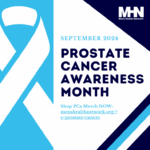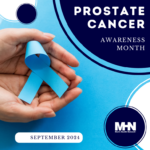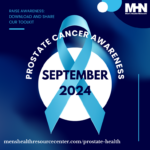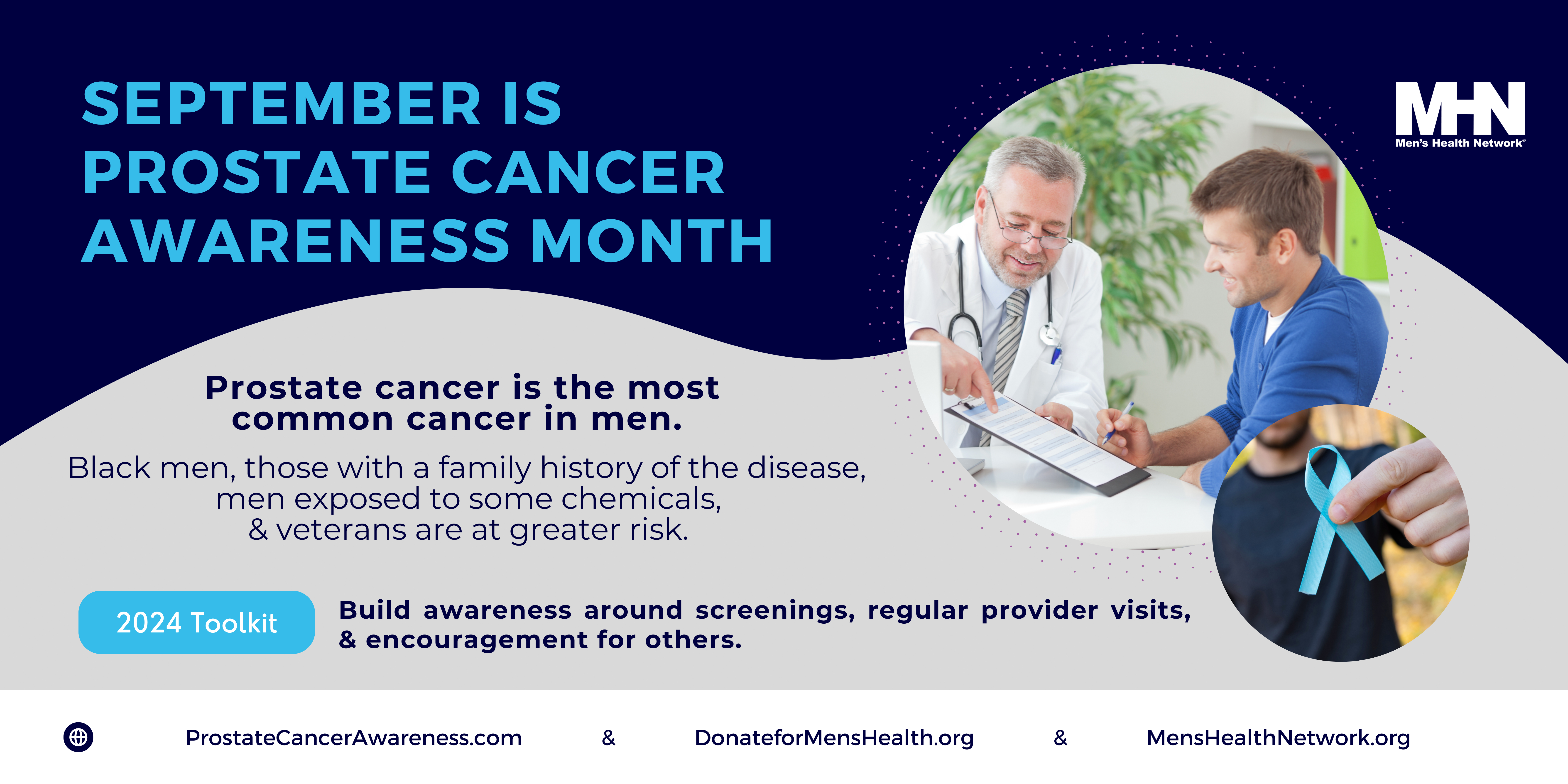September is Prostate Cancer Awareness Month – What You Need to Know
Prostate cancer is a critical health issue that affects a large number of men worldwide.
With September designated as Prostate Cancer Awareness Month, it’s an opportunity to promote awareness, encourage regular health screenings, and educate men about early detection and treatment. Prostate cancer is the most common cancer among men, and understanding the risks, symptoms, and prevention strategies is essential for reducing its impact.
This blog covers key information on prostate cancer and how you can get involved in raising awareness and supporting the cause.

What is Prostate Cancer?
Prostate cancer occurs when cells in the prostate, a small gland located below the bladder, begin to grow uncontrollably. The prostate plays an important role in producing fluid that nourishes and transports sperm. Prostate cancer can develop slowly or quickly, and early detection is key to effective treatment.
Each year, around 299,010 new cases of prostate cancer are diagnosed in the U.S., and approximately 35,250 men die from the disease. This underscores the importance of early detection and awareness.
Who is at Risk?
Several factors can increase a man’s risk of developing prostate cancer.
Understanding these risk factors can help you take steps toward prevention and early detection.
- Age: Prostate cancer primarily affects men over the age of 50. As men age, the likelihood of developing the disease increases.
- Family History: A family history of prostate cancer can elevate the risk. Men with close relatives, such as a father or brother, who have been diagnosed with prostate cancer should consider talking to their healthcare provider about screenings.
- Chemical Exposure: Exposure to certain chemicals may also increase the likelihood of developing prostate cancer. Veterans who were exposed to chemicals such as Agent Orange are encouraged to discuss their risk with a healthcare provider.
Symptoms of Prostate Cancer
In its early stages, prostate cancer often has no noticeable symptoms, which makes regular screenings vital.
As the cancer advances, some men may experience the following symptoms:
- Difficulty urinating or starting and stopping urine flow
- Weak or interrupted urine stream
- Pain or discomfort during urination
- Blood in the urine or semen
- Persistent pain in the back, hips, or pelvis
If any of these symptoms occur, it’s important to consult a healthcare professional for further evaluation.

The Importance of Screening
Regular screening is one of the most effective ways to detect prostate cancer early when it is most treatable. Men should discuss their risk factors with their healthcare providers to determine the right time to begin screenings. In general, men at higher risk may start screenings as early as age 40, while others should consider starting at age 50.
Common screening methods include:
- Prostate-Specific Antigen (PSA) Test: This blood test measures the level of PSA in the bloodstream. Higher-than-normal PSA levels may indicate prostate cancer or other prostate issues.
- Digital Rectal Exam (DRE): During this exam, a healthcare provider manually checks the prostate for any irregularities.
Early detection through these screenings can significantly increase the chances of successful treatment.
How to Get Involved in Prostate Cancer Awareness
There are many ways to raise awareness about prostate cancer, from digital initiatives to in-person events. Getting involved helps spread the word about the importance of early detection and treatment.
Digital Media Engagement
- Social Media: Use platforms like Facebook, Instagram, and X (formerly Twitter) to share information about prostate cancer.
- Popular hashtags include: #ProstateCancer, #PCAM, and #PCAM24.
- Encourage men to prioritize their health by promoting screenings and early detection.
- Newsletters and Blogs: Write articles on the importance of prostate cancer awareness, risk factors, and the benefits of early detection. Share these resources with your community through newsletters or online platforms.
- Virtual Events: Host or participate in virtual discussions and webinars focused on prostate health and the importance of regular checkups.
- Homeschool Activations: Educators can introduce prostate cancer awareness in their curriculum, teaching students the importance of health literacy and self-examinations.
In-Person Events
- Health Fairs and Screenings: Attend or organize health fairs where men can receive prostate cancer information and screenings. These events can provide valuable resources and encourage men to get checked.
- ‘Wear Blue’ Day: Encourage people to wear blue in support of prostate cancer awareness. Use this opportunity to raise funds or educate your community about prostate health.
- Fatherhood and Community Events: Host community gatherings or fatherhood events where prostate cancer awareness can be discussed, and participants can learn about the importance of regular health checkups.
- Proclamations: Work with local leaders to proclaim September as Prostate Cancer Awareness Month in your area, encouraging men to get informed about the disease and discuss screening options with their healthcare providers.
What You Can Do
Beyond raising awareness, there are simple actions you can take to protect your health and support others in doing the same.
- Regular Checkups: Encourage regular healthcare visits and prostate screenings for yourself, family members, and friends. Routine checkups can catch prostate cancer early, improving the chances of effective treatment.
- Self-Examinations: Learning to conduct self-examinations can help identify any abnormalities early. While this doesn’t replace professional screenings, it’s a useful step in maintaining prostate health.
- Healthy Lifestyle Choices: Staying physically active, eating a balanced diet, and avoiding smoking are all habits that promote overall health and may reduce the risk of developing prostate cancer.

Taking Action to Prevent Prostate Cancer
Prostate cancer is a significant health issue, but with early detection, treatment is often very successful. By raising awareness during Prostate Cancer Awareness Month, we can encourage men to take control of their health, schedule screenings, and learn more about this disease. Whether through digital engagement, community events, or one-on-one conversations, your efforts can make a big difference in spreading awareness and helping to save lives.
Take the first step this September by talking to a healthcare provider about prostate screenings, sharing information with your community, or participating in awareness activities.
Every action counts in the fight against prostate cancer.
Resources for Further Information
For more information on prostate cancer and how to get involved, the Men’s Health Network offers a variety of resources. One valuable resource is the Prostate Cancer Awareness Kit, which includes brochures, awareness pins, stress balls, and more.
You can purchase the kit here: [https://menshealthnetwork.org/store/prostate-cancer-awareness-kit].
The Men’s Health Network also provides:
HEALTHZONE is a free resource for planning and conducting health events at the local or corporate level. HEALTHZONE contains guidelines for hosting screenings, health fairs, and educational events.
You can download it for free at [MHNHealthZone.com].
More About: Men’s Health Network
Men’s Health Network (MHN) is a national nonprofit organization founded in 1994, committed to improving the health and well-being of men, boys, and their families. Dedicated to reaching men and boys where they live, work, play, and pray, MHN focuses on promoting preventive health, early detection, and treatment of diseases that disproportionately affect men, such as prostate cancer. Through educational resources, advocacy efforts, and community outreach, MHN encourages men to prioritize their health and take proactive measures. Their work helps reduce health disparities and supports men in leading healthier, more informed lives.




